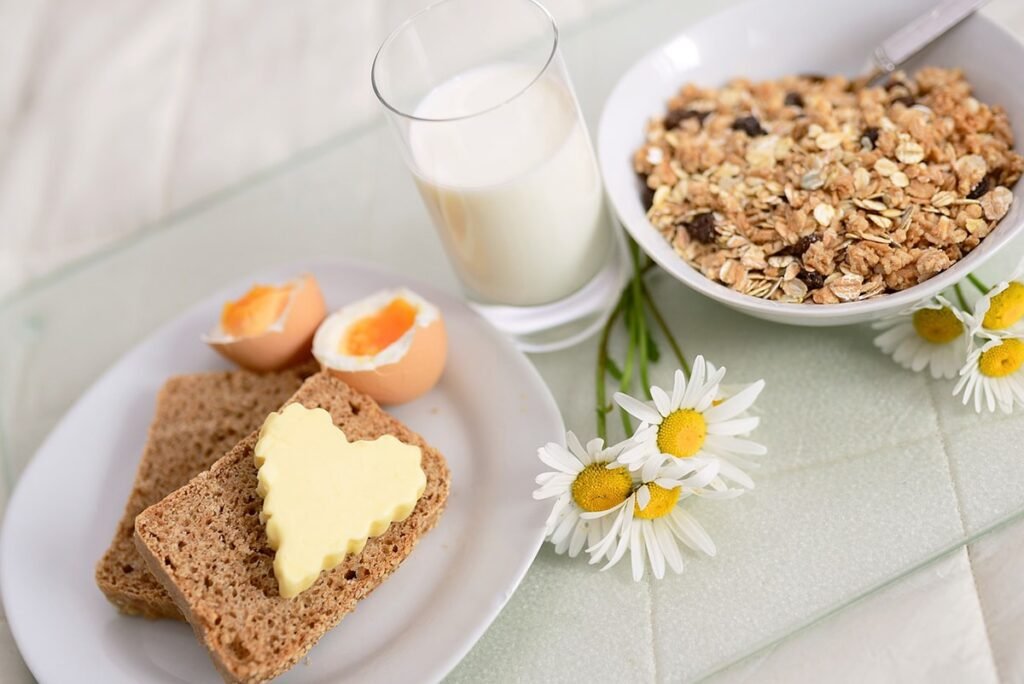Breakfast is often referred to as the most important meal of the day, providing essential nutrients and energy for the hours ahead. However, beyond its nutritional value, breakfast can serve as a powerful social ritual when shared with family or friends. Eating breakfast together fosters connection, communication, and emotional well-being, while encouraging healthier dietary habits. In today’s fast-paced world, where mornings are often rushed, intentionally creating time for shared breakfasts can have long-lasting positive effects. This article explores the benefits of eating breakfast together, practical strategies to make it happen, and plant-based ideas to ensure a wholesome and enjoyable meal for everyone.
The Importance of Breakfast

Breakfast serves as the first fuel source of the day, providing energy and essential nutrients after the overnight fast. Skipping breakfast can lead to decreased focus, low energy, and irregular eating patterns later in the day. When breakfast is shared with others, it not only nourishes the body but also nurtures relationships and emotional health.
Key components of a nutritious breakfast include:
- Whole grains: Oats, whole-grain bread, quinoa, or muesli
- Fruits and vegetables: Berries, bananas, avocado, tomatoes, spinach
- Plant-based protein: Nuts, seeds, tofu, or legumes
- Healthy fats: Avocado, nut butters, seeds, or olive oil
- Hydration: Water, herbal teas, or plant-based milk
Including a balance of these nutrients supports sustained energy, cognitive performance, and overall health.
Benefits of Eating Breakfast Together

1. Strengthens Family Bonds
Sharing breakfast creates opportunities for meaningful conversation and connection. Parents and children, or roommates and friends, can discuss plans, share experiences, or simply enjoy each other’s company. These moments strengthen relationships and foster a sense of belonging and security.
2. Promotes Healthy Eating Habits
Eating together encourages mindful eating and balanced choices. Studies show that children who have regular family meals are more likely to consume fruits, vegetables, and whole grains while avoiding excessive sugar and processed foods. Adults benefit as well, often choosing healthier, more satisfying options when breakfast is shared in a structured setting.
3. Improves Mental and Emotional Health
The social aspect of breakfast supports emotional well-being. Conversations during breakfast can reduce stress, provide emotional support, and create a positive start to the day. This ritual fosters gratitude, empathy, and a sense of routine, which contributes to mental stability and resilience.
4. Encourages Mindful Eating

Eating breakfast in a shared, calm environment encourages mindfulness. Instead of rushing or multitasking, individuals pay attention to the colors, textures, and flavors of food. Mindful eating improves digestion, enhances flavor appreciation, and prevents overeating later in the day.
5. Supports Cognitive Function and Focus
Shared breakfasts provide the energy and nutrients needed for optimal cognitive function. A balanced plant-based breakfast supports concentration, memory, and problem-solving skills, helping both children and adults start the day productively.
How to Make Breakfast Together Happen
1. Plan Ahead
Planning is essential for a stress-free shared breakfast. Identify the time that works best for everyone, whether it is weekday mornings or weekend brunches. Preparing ingredients the night before, such as overnight oats or pre-chopped fruits, saves time and reduces morning chaos.
2. Create a Routine

Establishing a consistent routine makes breakfast together a habit. Even small routines, like sitting down together five minutes earlier than usual, can reinforce connection and consistency. Weekends may allow for longer, more leisurely breakfasts, while weekday routines can focus on efficiency without sacrificing quality.
3. Keep It Simple
Breakfast does not need to be elaborate to be meaningful. Simple, plant-based meals can be nutritious, quick, and delicious. Examples include:
- Overnight oats: Rolled oats soaked in plant-based milk, topped with fruits, nuts, and seeds
- Smoothie bowls: Blended fruits and vegetables with granola, chia seeds, and a drizzle of nut butter
- Avocado toast: Whole-grain bread topped with avocado, tomatoes, sprouts, and a sprinkle of seeds
- Vegan pancakes or waffles: Made with whole-grain flour, plant-based milk, and natural sweeteners
Simplicity allows the focus to remain on connection rather than complex preparation.
4. Make It Interactive
Involving everyone in breakfast preparation strengthens engagement and enjoyment. Assign simple tasks such as chopping fruits, stirring batter, or setting the table. This encourages collaboration and allows participants to contribute to the meal.
5. Create a Pleasant Environment
Atmosphere enhances the breakfast experience. Consider the following:
- Use a clean, inviting table with colorful placemats or tableware
- Play soft background music to create a relaxed ambiance
- Ensure comfortable seating and adequate lighting
- Incorporate natural elements, such as flowers or seasonal fruits, for visual appeal
6. Encourage Conversation

Breakfast is an opportunity to connect. Avoid distractions like phones or television during shared meals. Engage in meaningful discussions about daily plans, goals, or personal reflections. Ask open-ended questions to foster dialogue and understanding.
7. Adapt to Different Schedules
In modern households, schedules may differ. Shared breakfast time can be adapted creatively:
- Staggered schedules: Prepare breakfast in advance so that individuals can join when convenient
- Batch preparation: Cook larger quantities and enjoy leftovers together
- Flexible formats: Weekend brunches or mid-morning snacks can supplement early morning routines
Flexibility ensures that the ritual remains consistent even when schedules vary.
Plant-Based Breakfast Ideas for Shared Meals
1. Savory Options
- Tofu Scramble: Protein-rich and customizable with vegetables, herbs, and spices
- Vegan Breakfast Burrito: Whole-grain wrap filled with beans, vegetables, and avocado
- Grain Bowls: Quinoa or oats with sautéed vegetables, seeds, and a tahini drizzle
- Savory Pancakes: Chickpea flour pancakes with spinach and herbs
2. Sweet Options
- Overnight Oats: Rolled oats with almond milk, chia seeds, berries, and a touch of maple syrup
- Smoothie Bowls: Blended fruits topped with granola, coconut flakes, and nuts
- Vegan Muffins: Banana, blueberry, or pumpkin varieties made with whole-grain flour
- Fruit Parfaits: Layers of plant-based yogurt, fresh fruits, and granola
3. Beverage Options
- Herbal or Green Tea: Provides hydration and antioxidants
- Plant-Based Milk Lattes: Almond, oat, or soy milk with a dash of cinnamon
- Fresh Juice: Orange, carrot, or green juices for natural sweetness and vitamins
- Smoothies: Nutrient-dense and easily customized for all tastes
Overcoming Challenges
Even with the best intentions, eating breakfast together may face obstacles. Common challenges and solutions include:
- Time constraints: Prepare quick options or pre-make dishes the night before
- Differing tastes: Offer a variety of plant-based dishes so everyone can choose their favorite
- Distractions: Designate a phone-free or screen-free zone during breakfast
- Lack of motivation: Emphasize the emotional and health benefits to encourage participation
Long-Term Benefits of Shared Breakfasts
Regularly eating breakfast together provides lasting advantages:
- Stronger relationships: Consistent communication and shared experiences strengthen bonds
- Better dietary habits: Balanced, plant-based meals support physical health and nutrient intake
- Improved mental well-being: Rituals provide structure, reduce stress, and enhance emotional stability
- Enhanced family or group cohesion: Shared meals foster a sense of unity and shared purpose
Conclusion
Eating breakfast together is more than a routine; it is a meaningful ritual that nourishes both body and soul. By emphasizing plant-based, nutrient-rich foods, shared breakfasts promote health, mindfulness, and connection. Planning ahead, creating a pleasant environment, and engaging in interactive meal preparation transform breakfast into a shared experience that strengthens relationships, supports emotional well-being, and encourages healthier eating habits.
From simple overnight oats and smoothie bowls to savory tofu scrambles and grain-based dishes, breakfast can be both nutritious and enjoyable. Establishing a regular habit of eating together, even for a few minutes each day, offers long-term benefits for physical health, mental clarity, and social cohesion.
In today’s busy world, taking the time to share breakfast is an investment in relationships, personal well-being, and mindful living. By making it a priority, anyone can create a nurturing, balanced, and cozy start to the day, transforming the first meal into a cherished ritual that strengthens bonds and fosters holistic wellness.
